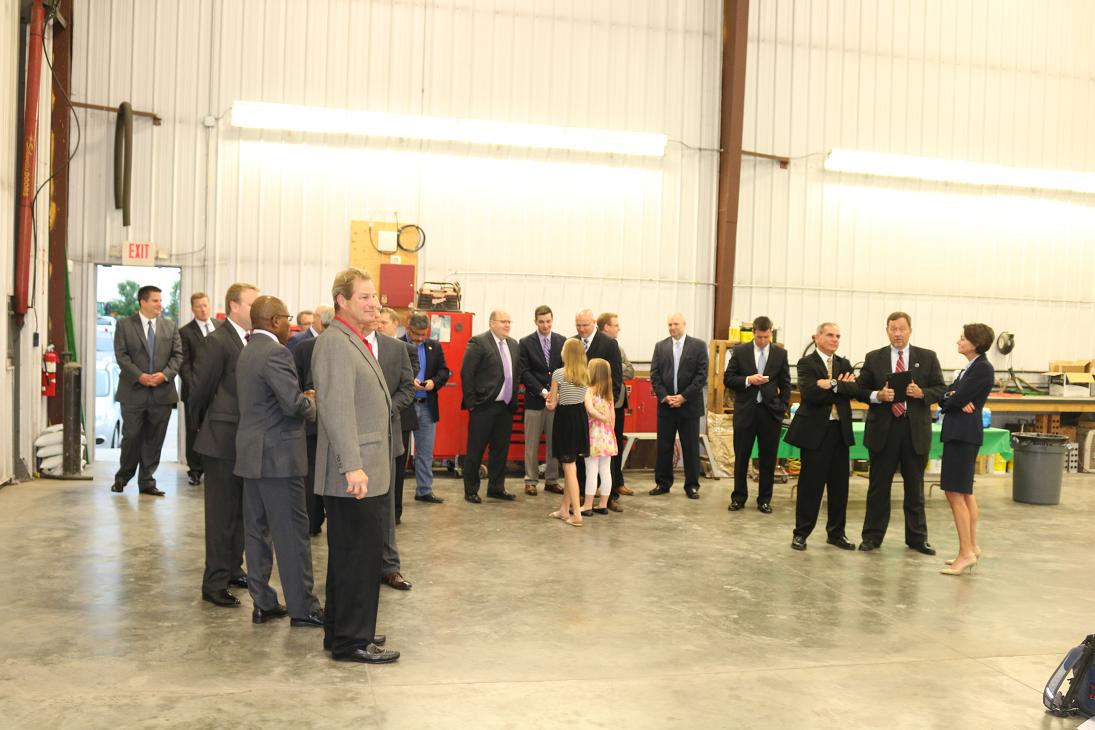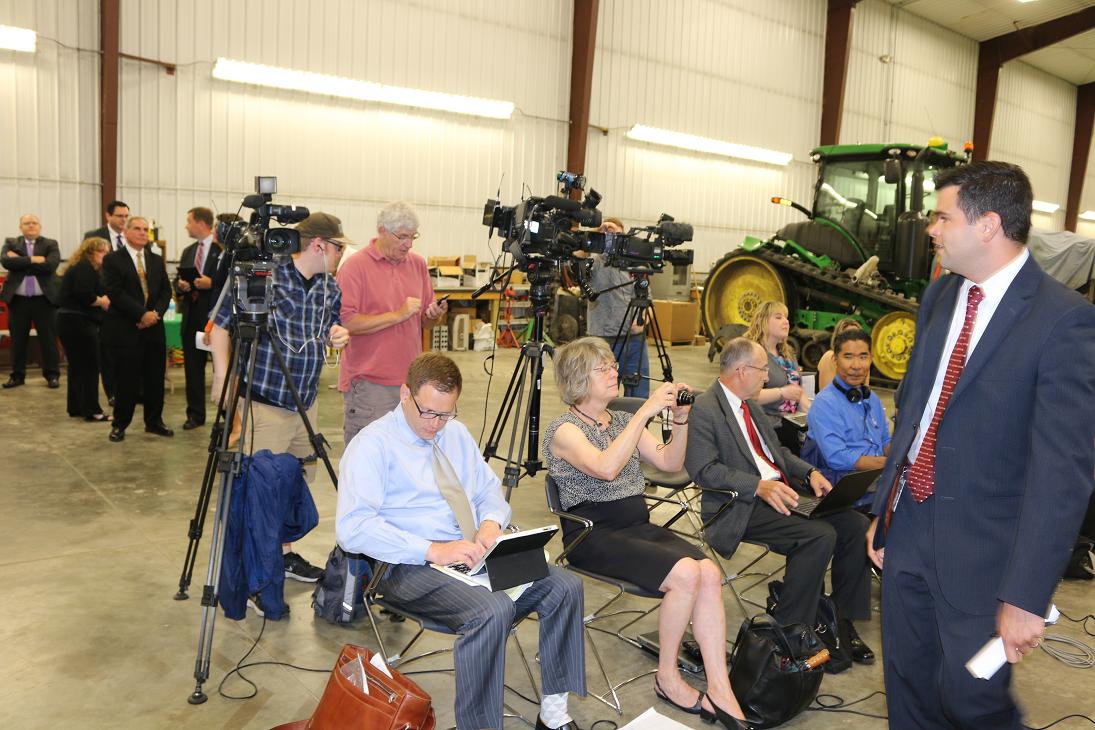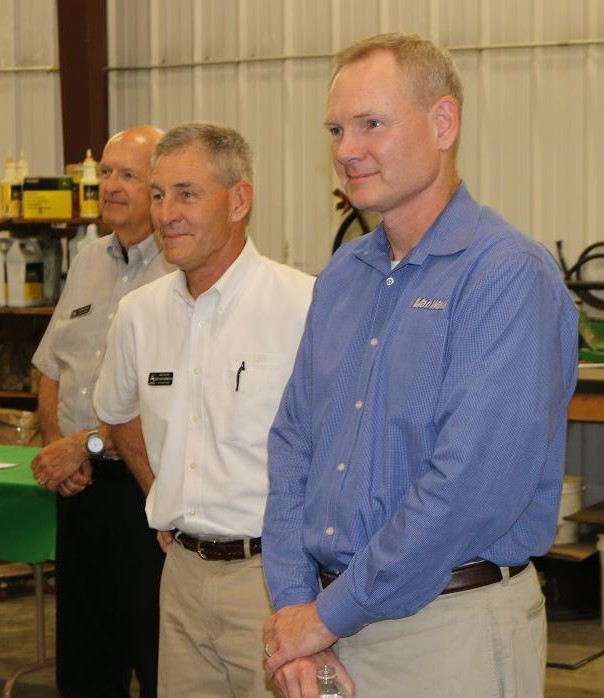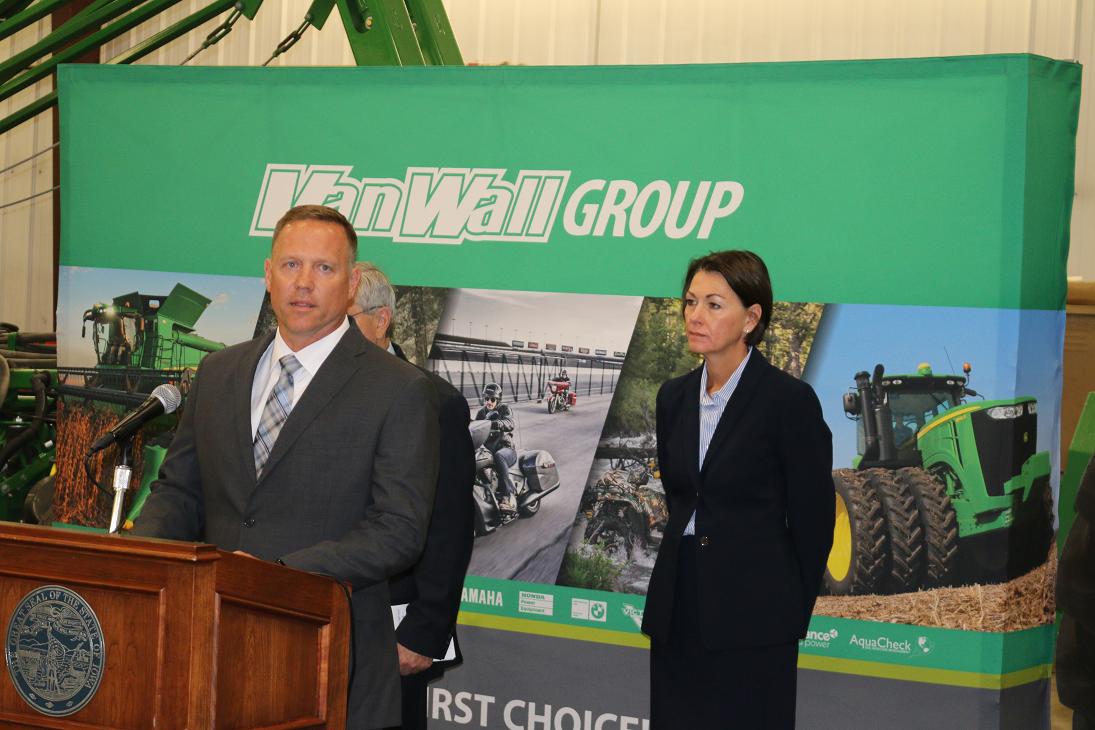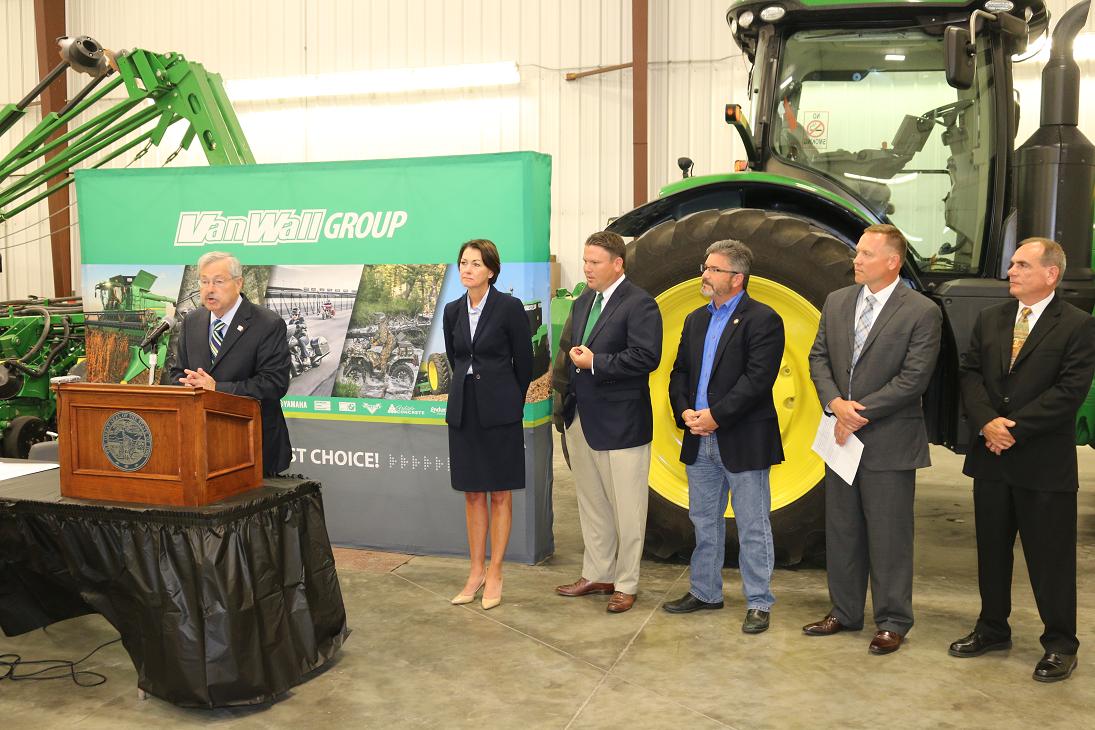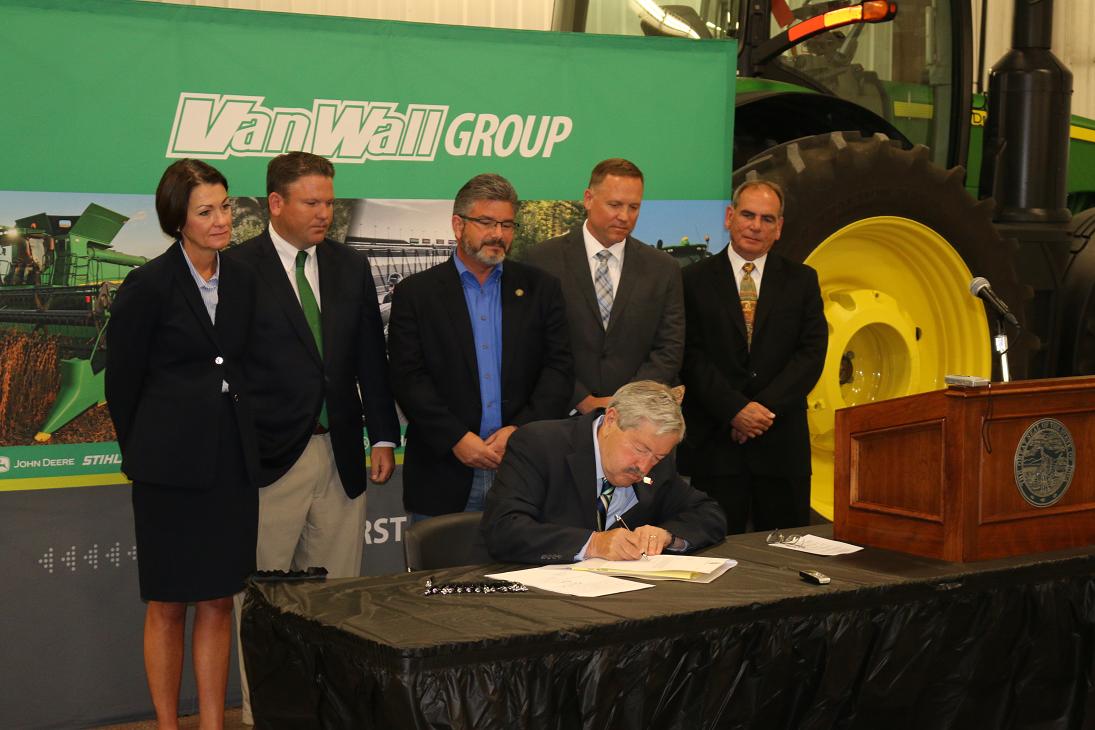
Using Van Wall Equipment’s data-driven John Deere tractors as a backdrop, Iowa Gov. Terry Branstad signed the Connect Every Acre bill Monday and explained the role high-speed Internet access will play in the modernization of Iowa’s agriculture industry.
The goal of Connect Every Acre is to provide high-speed connectivity to underserved areas around the state, particularly Iowa’s farms and rural communities, Branstad said.
The bill cleared the Iowa legislature several weeks ago with bipartisan support, although lawmakers rejected the governor’s request for $5 million in incentive grants and only agreed to offer property tax abatements to companies willing to invest in expanding the state’s broadband infrastructure.
The bill defines high-speed Internet service as a minimum 25-megabits-per-second download speed and a 3-megabits-per-second upload speed. Robert von Wollfradt, the state’s chief information officer, estimated the portion of the state already having access to such connection speeds is “in the neighbor of 50 to 60 percent,” according to his “best guess based on (Federal Communications Commission) data.” Even that coverage is “spotty” in places, von Wollfradt said.
Branstad pushed for a broadband-expansion bill in each of the last two legislative sessions, claiming access to high-speed Internet service is crucial to keeping Iowa competitive both in public education and private business, particularly in agriculture, with farmers increasingly relying on high-tech equipment to raise crops and livestock profitably.
A state report issued in 2013 said two-thirds of rural Iowans subscribe to broadband service at home compared to the 75 percent average for urban and suburban Iowans. Rural Iowans are also less likely than others to subscribe to mobile broadband services using a cellphone or other mobile device.
Businesses are also underserved, according to a 2014 report by the Iowa Partnership for Economic Progress. About one-third of Iowa businesses, 13,000 in all, said they “want higher broadband speeds that cannot be supported at their current locations. Even more disconcerting is that only 21 percent of Iowa businesses have redundant broadband services, making their business operations vulnerable to stoppages due to downtime in service.”
Branstad said the Connect Every Acre bill is a step toward closing the Internet gap in rural Iowa.
“Our state already has a low unemployment rate of 3.8 percent but to continue our growth, we must look at ways to encourage connecting every acre of Iowa to high-speed broadband,” said Branstad. “I’m pleased with the strong bipartisan support this measure received in the Iowa Legislature.”
Even in the absence of funding, the bill pleases wireless companies by creating a uniform process for locating new cellphone towers, making modifications to existing towers and co-locating towers. The rights and responsibilities of local governments in relation to cell tower applications are also spelled out in the bill, satisfying local authorities concerned about protecting their control over local zoning decisions.
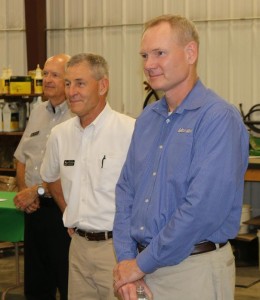
Don Van Houwelling, president of Van Wall Equipment and host of the bill-signing event, said he supports the goals of Connect Every Acre. He was joined by his son, Mike Van Houwelling, and Van Wall Equipment Territory Manager Norman Little in welcoming the governor and other state politicians to the Perry store for the ceremony.
Van Houwelling said modern agriculture increasingly depends on information management, and the sophisticated John Deere tractors sold out of his 20 Van Wall Equipment outlets around the state are essentially rolling computers.
“A tractor is a data-transport system,” Van Houwelling said. “Each one has a built-in module using direct, wireless data transfer from the machine directly to the cloud and then to servers in Chicago.”
High-tech tractors with real-time monitoring capabilities are part of the “paradigm shift to data management” that is rapidly changing the methods of large-scale modern farming, he said. Reliable connectivity to high-speed Internet services is crucial to the modernization process.
“Data is information converted to knowledge,” Van Houwelling said, “and our goal is to help farmers manage their farms more profitably. Few people understand what’s going on today and how fast technology is changing what we do,” he said.
Van Houwelling’s tractors are optimized for precision farming by connecting to the Internet and through wireless cellular signals. Without ready high-speed connections across the state, the tractors’ capabilities are wasted and productivity is diminished.

“One of the challenges is it all takes baby steps,” said Debra Lucht, general manager of Minburn Communications, which provides broadband service to Van Wall’s Perry store. “From the perspective of connecting every acre, it’s a pretty lofty objective. There’s a lot of costs associated with it and as there’s more competition coming into the arena, you have to be able to justify the cost associated with taking broadband into rural Iowa, let alone to every acre. Our companies are striving to deploy broadband and upgrade our facilities, but it is a pretty lofty goal.”
Branstad did not offer a specific dollar figure for the cost of connecting every acre, saying only that while “significant investments have already been made,” it will still take “a lot of money.”
Lucht agreed the project will be costly, and she said it will take a long time to achieve.
“When you look at a fiber-optic connection to the farmhouse, it takes, on average, in an exchange area, $3,000 to $5,000 per customer to take a drop,” Lucht said. “Or you can calculate it based on a mile. It costs anywhere from $16,000 to $20,000 per mile to run fiber optics. So you put that on the grand scale of things, and that tells you how much it costs.”
Lucht also said a high-speed system “that allows for interconnectivity between multiple different types of carriers” would be needed in order to approach the river-to-river coverage envisioned by the Connect Every Acre bill.
“Because we’re an agricultural state and so much of what farmers are doing in the tractors requires internet connectivity to take the information that the tractors are pulling from the work they’re doing, the objective here is to be able to download and utilize that information,” she said. “It’s going to have to be a blend of multiple different types of technology to access the broadband to make that happen. It can’t be any one solution. It’s going to take concerted efforts and initiatives from different types of carriers.”









